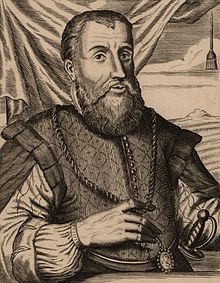Diego Velázquez de Cuéllar
| Diego Velázquez de Cuéllar | |
|---|---|
 |
|
| 5th Governor of the Indies | |
|
In office 1518–1524 |
|
| Preceded by | Diego Columbus |
| Succeeded by |
Hernán Cortés as the Governor of New Spain |
| 1st Governor of Cuba | |
|
In office 1511–1524 |
|
| Succeeded by | Manuel de Rojas y Cordova |
| Personal details | |
| Born | 1465 Cuéllar, Segovia, Crown of Castile |
| Died | 1524 (aged 58–59) Santiago de Cuba, Cuba |
| Nationality | Spanish |
| Profession | Political |
| Religion | Roman Catholic |
Diego Velázquez de Cuéllar (1465 in Cuéllar, Spain – c. June 12, 1524 in Santiago de Cuba) was a Spanish conquistador. He conquered and governed Cuba on behalf of Spain and moved Havana from the south coast of western Cuba to the north coast, placing it well as a port for Spanish trade.
Little is known about the early life of Diego Velázquez. He was born in Cuéllar c. 1465, in the Segovia region of Spain. He distinguished himself in battle in Naples before moving to Seville, where he met Bartholomew Columbus. He first visited the New World with the crew of Christopher Columbus's second voyage in 1493.
He settled in Hispaniola, which he helped pacify under the leadership of Nicolás de Ovando, the Governor of the Indies. According to historian Troy S. Floyd, "Velazquez himself, reportedly wealthy in island terms by 1511, held encomiendas at Verapaz, Salvatierra de la Sabana, and Santiago de Caballeros, where he was in partnership with an unidentified encomendero in mining enterprises."
He married the daughter of Cristóbal de Cuellar, who died soon afterwards. He never remarried.
He was named to lead the expedition of conquest of Cuba in 1511, with 300 men, a three-year undertaking noted for its brutality. He acted under orders from Diego Columbus, recently restored as Viceroy of the Indies. He founded a number of new Spanish settlements and cities on the island, first Baracoa in 1511 and then most notably Santiago de Cuba in 1514 and Havana in 1515. Velázquez was appointed Governor of Cuba. The new settlers did not wish to be under the personal authority of Diego Columbus, so Velázquez convoked a general cabildo (a local government council) which was duly authorized to deal directly with Spain, and therefore removed Velázquez and the settlers from under the authority of Columbus, their nominal superior. It was a precedent that would come back to haunt him with the Mexican adventures.
...
Wikipedia
